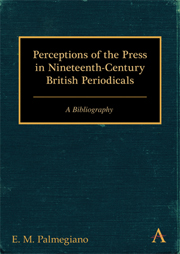Book contents
- Frontmatter
- Contents
- Preface
- Introduction
- Annotated Bibliography
- Ainsworth's Magazine, 1842–1854
- All the Year Round, 1859–1895
- Bentley's Miscellany, 1837–1868
- Bentley's Quarterly Review, 1859–1860
- Blackwood's Edinburgh Magazine, 1824–1900
- The British and Foreign Review, 1835–1844
- The British Quarterly Review, 1845–1886
- Chambers's (Edinburgh) Journal, 1832–1900
- The Contemporary Review, 1866–1900
- The Cornhill Magazine, 1860–1900
- The Dark Blue, 1871–1873
- The Dublin Review, 1836–1900
- The Dublin University Magazine, 1833–1880
- The Edinburgh Review, 1802–1900
- The Foreign Quarterly Review, 1827–1846
- The Fortnightly Review, 1865–1900
- Fraser's Magazine for Town and Country, 1830–1882
- Good Words, 1860–1900
- Hogg's (Weekly) Instructor, 1845–1856
- The Home and Foreign Review, 1862–1864
- Household Words, 1850–1859
- Howitt's Journal, 1847–1848
- The Leisure Hour, 1852–1900
- The London Quarterly Review, 1853–1900
- The London Review, 1829–1830
- Longman's Magazine, 1882–1900
- Macmillan's Magazine, 1859–1900
- The Modern Review, 1880–1884
- The Monthly Chronicle, 1838–1841
- Murray's Magazine, 1887–1891
- The National Review, 1855–1864
- The National Review, 1883–1900
- The New Monthly Magazine, 1821–1854
- The New Quarterly Magazine, 1873–1880
- The New Review, 1889–1897
- The Nineteenth Century, 1877–1900
- The North British Review, 1844–1871
- The Oxford and Cambridge Magazine, 1856
- The Prospective Review, 1845–1855
- The Quarterly Review, 1824–1900
- The Rambler, 1848–1862
- Saint Pauls, 1867–1874
- The Scottish Review, 1882–1900
- Tait's Edinburgh Magazine, 1832–1855
- Temple Bar, 1860–1900
- The Theological Review, 1864–1879
- Titan: A Monthly Magazine, 1856–1859
- The Westminster Review, 1824–1900
- Key to Indexes
- Author Index
- Subject Index
The Westminster Review, 1824–1900
from Annotated Bibliography
Published online by Cambridge University Press: 05 May 2012
- Frontmatter
- Contents
- Preface
- Introduction
- Annotated Bibliography
- Ainsworth's Magazine, 1842–1854
- All the Year Round, 1859–1895
- Bentley's Miscellany, 1837–1868
- Bentley's Quarterly Review, 1859–1860
- Blackwood's Edinburgh Magazine, 1824–1900
- The British and Foreign Review, 1835–1844
- The British Quarterly Review, 1845–1886
- Chambers's (Edinburgh) Journal, 1832–1900
- The Contemporary Review, 1866–1900
- The Cornhill Magazine, 1860–1900
- The Dark Blue, 1871–1873
- The Dublin Review, 1836–1900
- The Dublin University Magazine, 1833–1880
- The Edinburgh Review, 1802–1900
- The Foreign Quarterly Review, 1827–1846
- The Fortnightly Review, 1865–1900
- Fraser's Magazine for Town and Country, 1830–1882
- Good Words, 1860–1900
- Hogg's (Weekly) Instructor, 1845–1856
- The Home and Foreign Review, 1862–1864
- Household Words, 1850–1859
- Howitt's Journal, 1847–1848
- The Leisure Hour, 1852–1900
- The London Quarterly Review, 1853–1900
- The London Review, 1829–1830
- Longman's Magazine, 1882–1900
- Macmillan's Magazine, 1859–1900
- The Modern Review, 1880–1884
- The Monthly Chronicle, 1838–1841
- Murray's Magazine, 1887–1891
- The National Review, 1855–1864
- The National Review, 1883–1900
- The New Monthly Magazine, 1821–1854
- The New Quarterly Magazine, 1873–1880
- The New Review, 1889–1897
- The Nineteenth Century, 1877–1900
- The North British Review, 1844–1871
- The Oxford and Cambridge Magazine, 1856
- The Prospective Review, 1845–1855
- The Quarterly Review, 1824–1900
- The Rambler, 1848–1862
- Saint Pauls, 1867–1874
- The Scottish Review, 1882–1900
- Tait's Edinburgh Magazine, 1832–1855
- Temple Bar, 1860–1900
- The Theological Review, 1864–1879
- Titan: A Monthly Magazine, 1856–1859
- The Westminster Review, 1824–1900
- Key to Indexes
- Author Index
- Subject Index
Summary
Grounded originally in Benthamite radicalism, the Westminster incorporated the London Review molded by John Stuart Mill in the 1830s and the Foreign Quarterly Review in the 1840s. Before and after these amalgamations, the Westminster broadcast insightful appraisals of the newspaper, of eminent periodicals, and of the status of journalists.
1. [Fox, W. J.]. “Men and Things in 1823.” 1 (1824): 1–18.
Estimated that two-penny magazines, “some of them respectably got up,” were “circulating to the amount of several thousand weekly.” “Periodical literature has enlarged its boundaries,” so it attracted those of “higher talent.”
2. [Bowring, John]. “Politics and Literature of Russia.” 1 (1824): 80–101.
Hoped that the intellectual progress of Russian women, already evidenced by those active in the country's periodical writing, might diminish despotism. See Foreign Quarterly Review 16: 445.
3. [Mill, James]. “Periodical Literature: Edinburgh Review.” 1 (1824): 206–49; [John Stuart Mill], 505–41; [James Mill]. “Quarterly Review.” 2 (1824): 463–503.
The senior Mill limited his essays to criticism, notably in the Edinburgh and Quarterly, because the scope of periodical literature was so wide. Periodicals that aimed for “immediate effect” echoed “opinions in vogue,” usually those of the powerful. The Edinburgh and Quarterly addressed the “aristocratic classes” from different perspectives. Although Edinburgh authors were people of “higher intellect,” the Review seemed unwilling to take a stand on press freedom (22: 72) but was ready to pander to prejudice.
- Type
- Chapter
- Information
- Perceptions of the Press in Nineteenth-Century British PeriodicalsA Bibliography, pp. 593 - 626Publisher: Anthem PressPrint publication year: 2012



